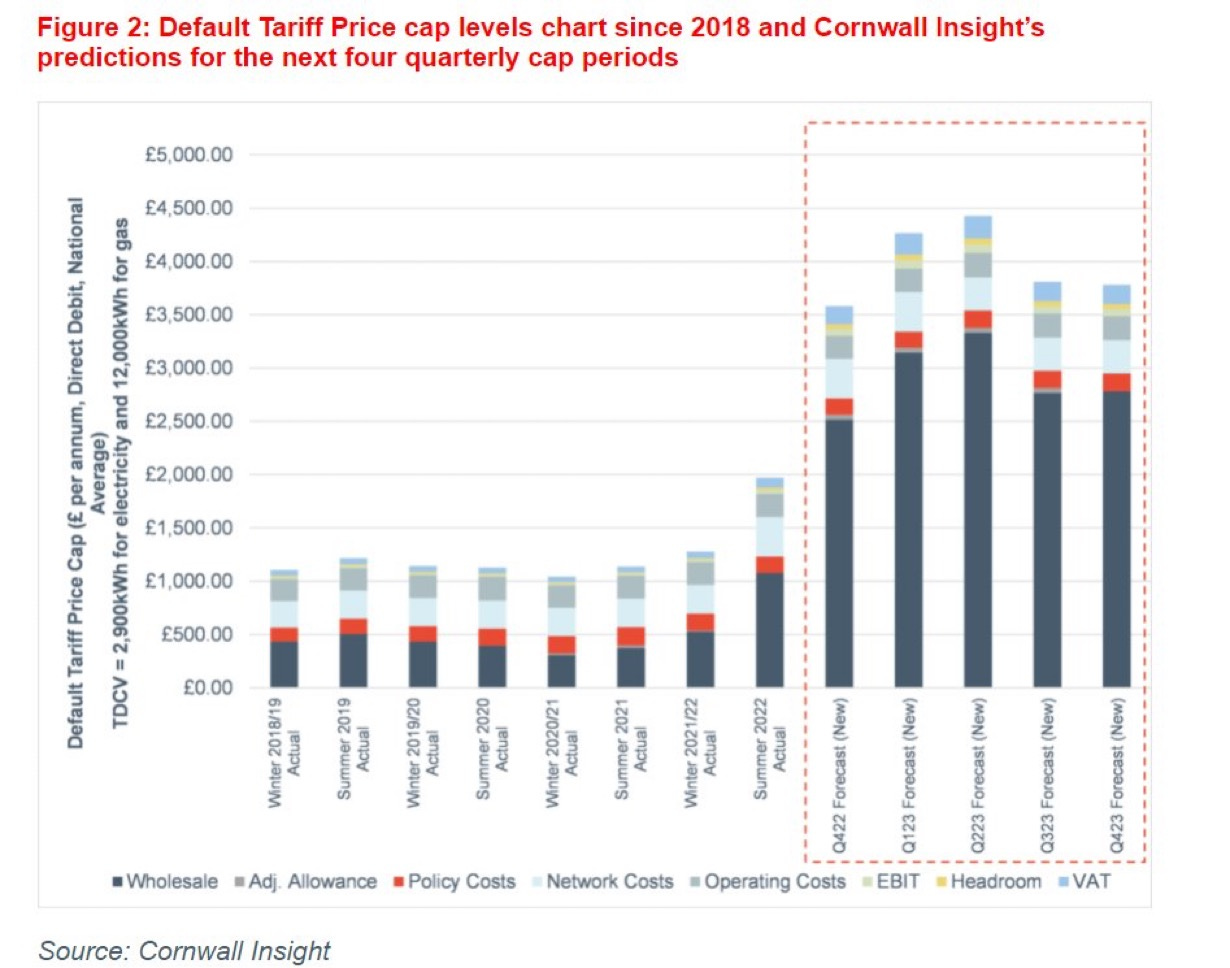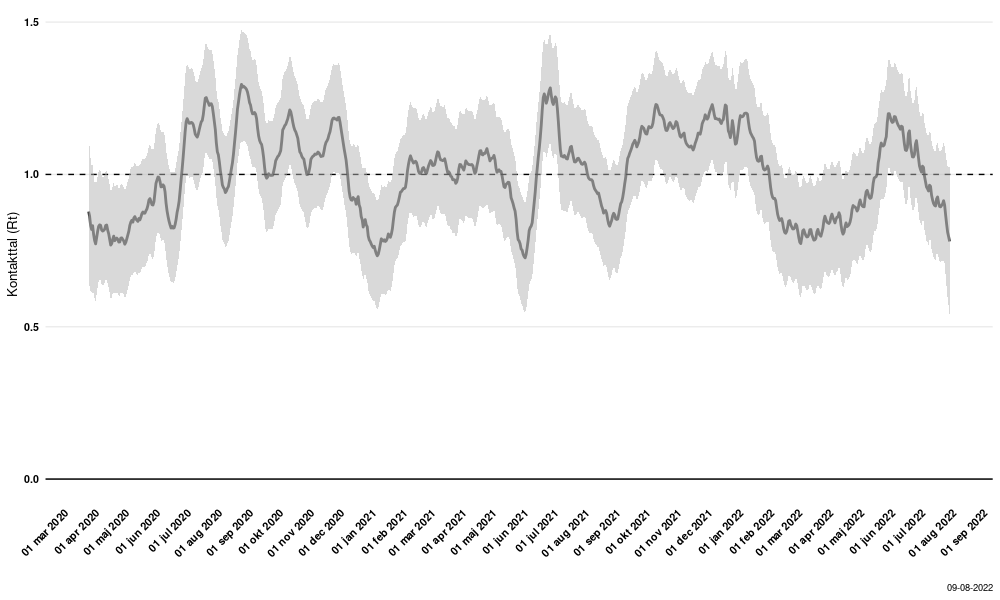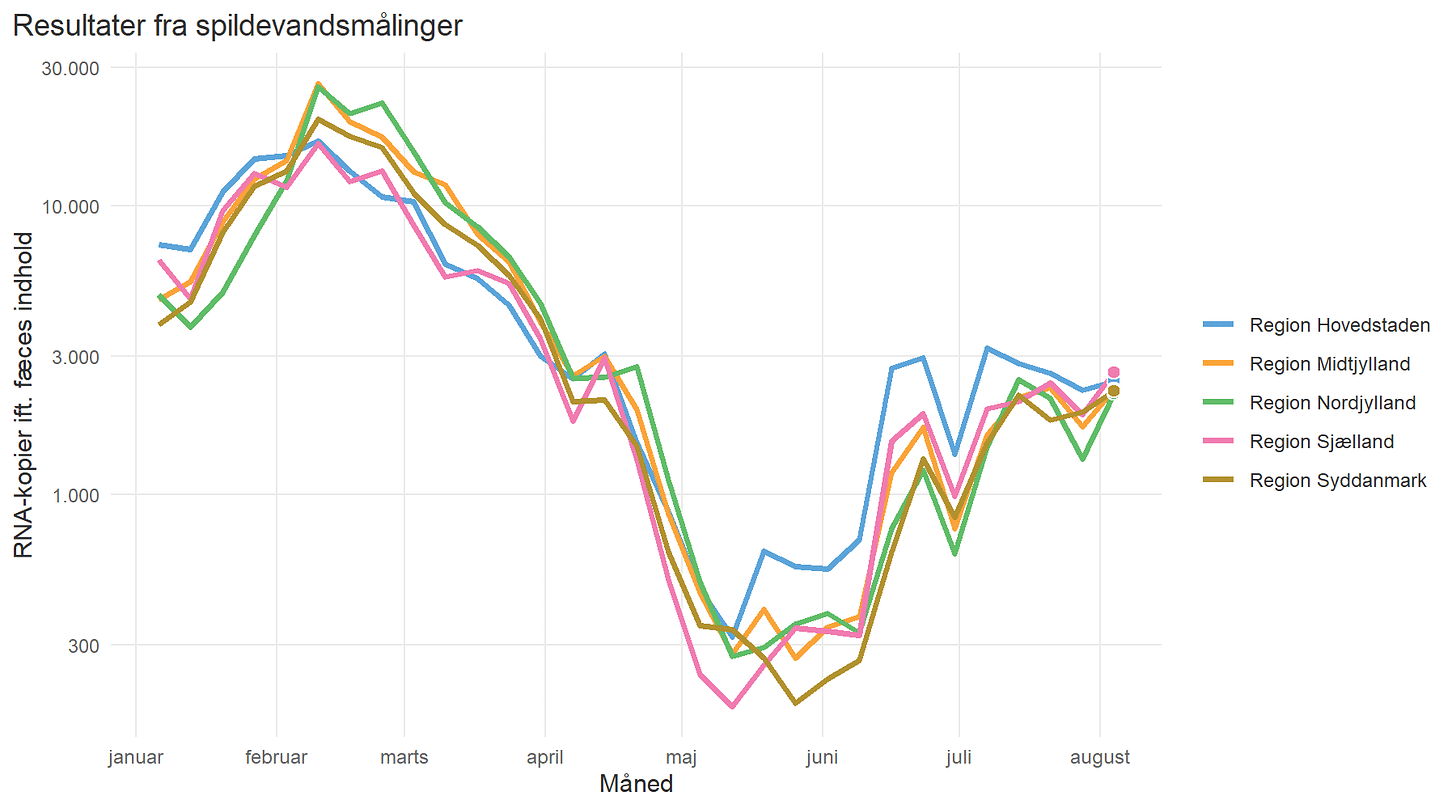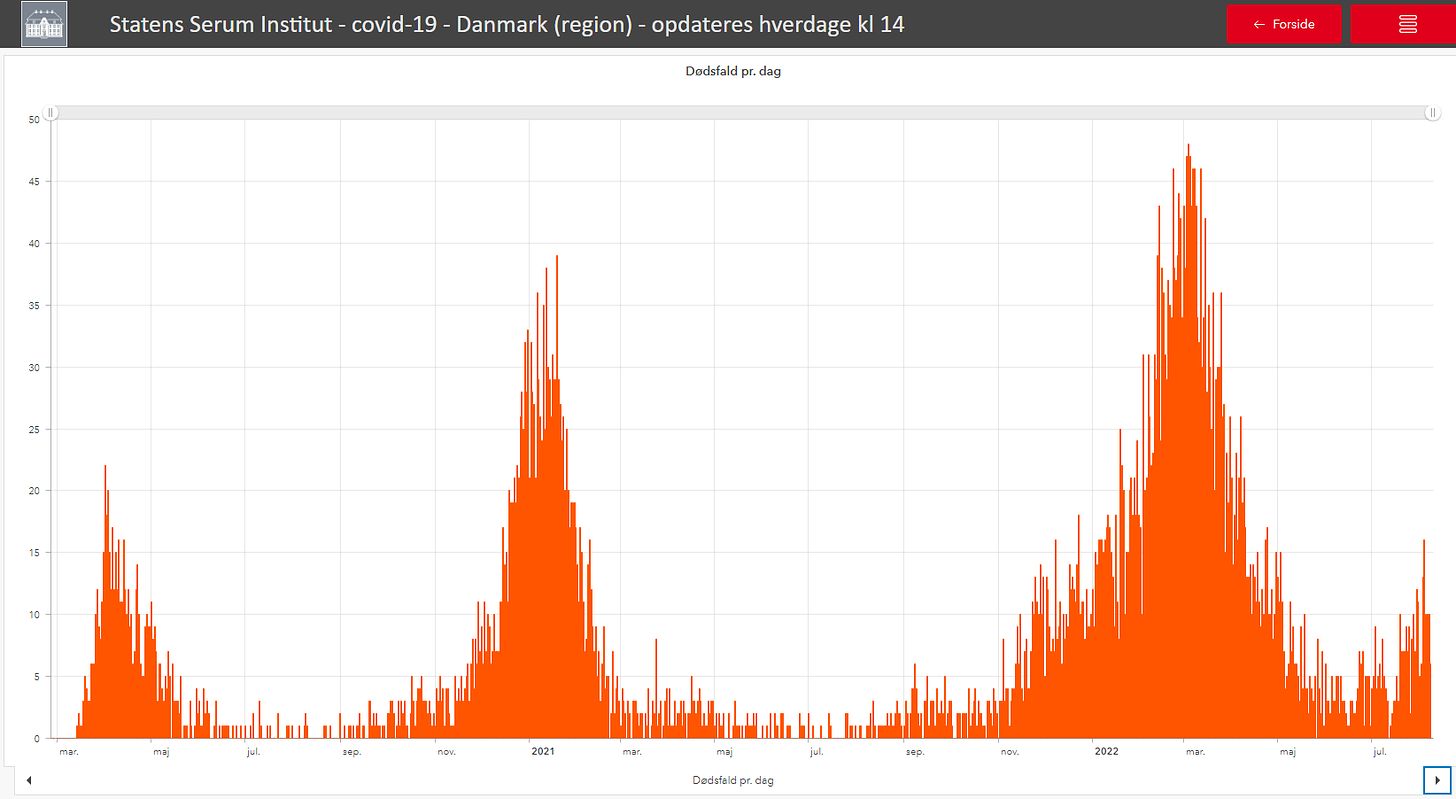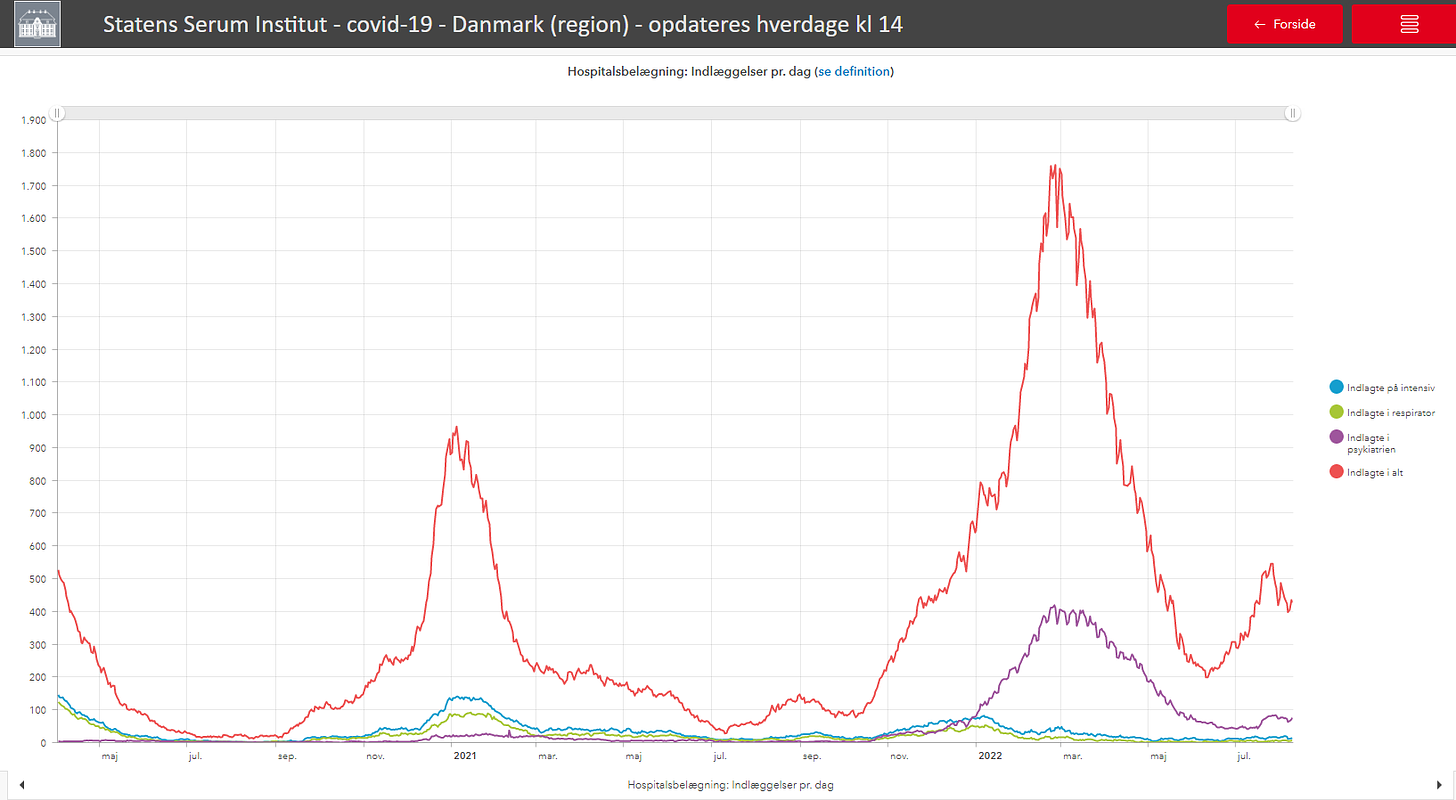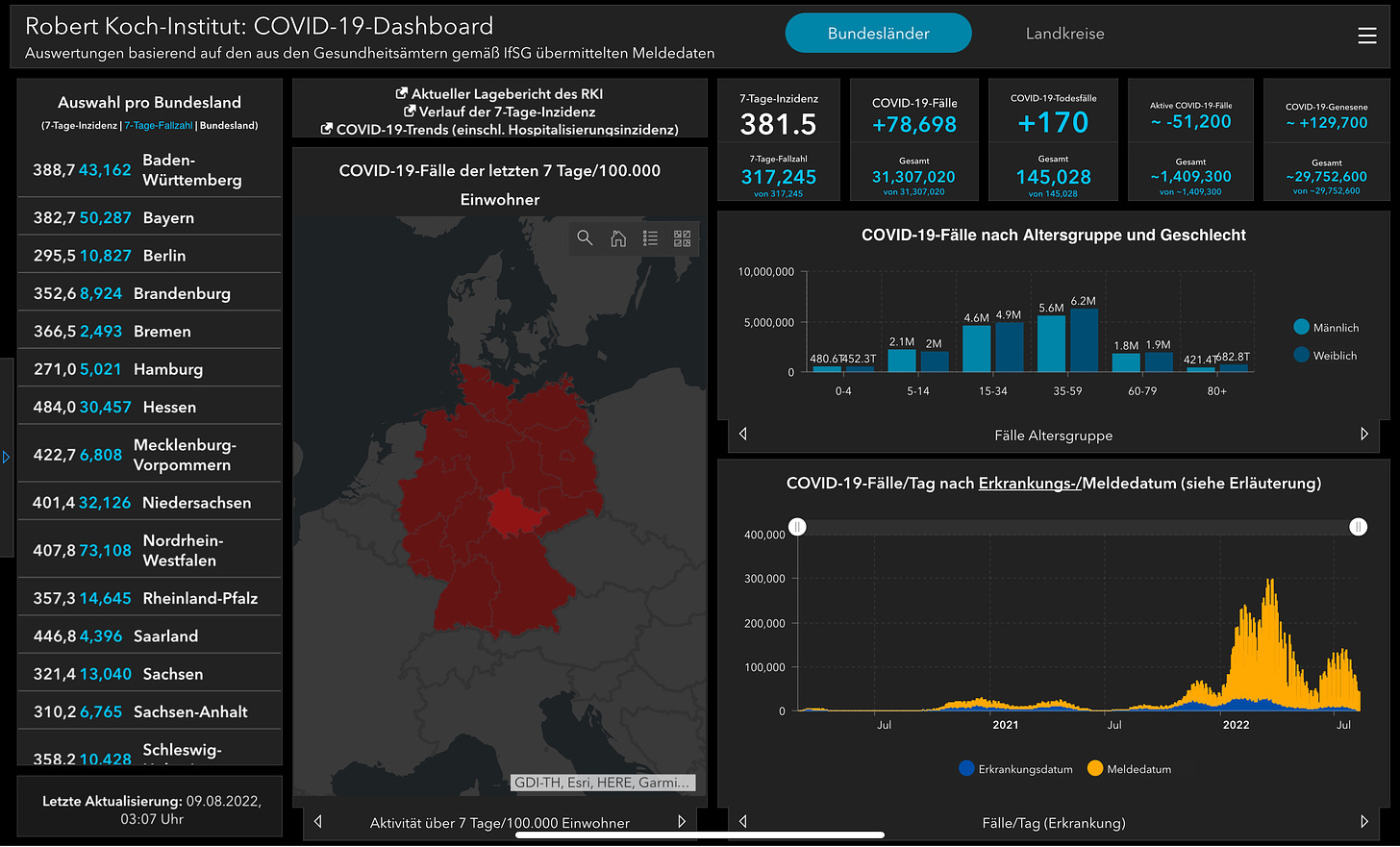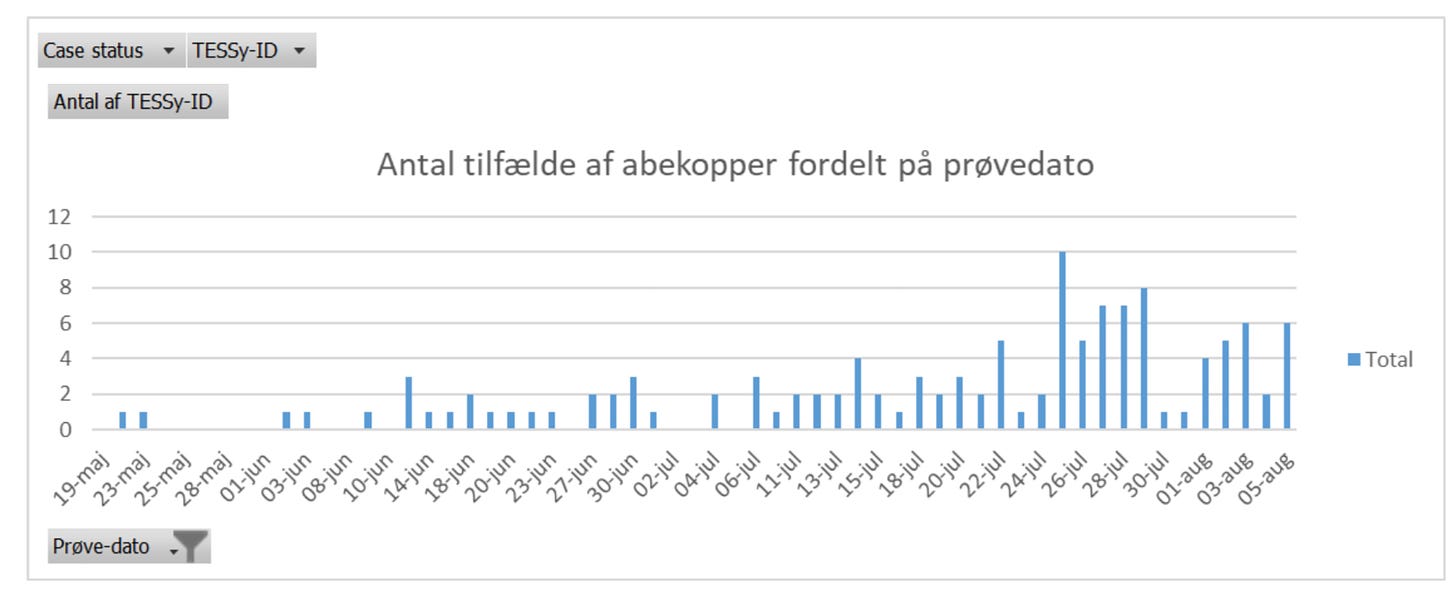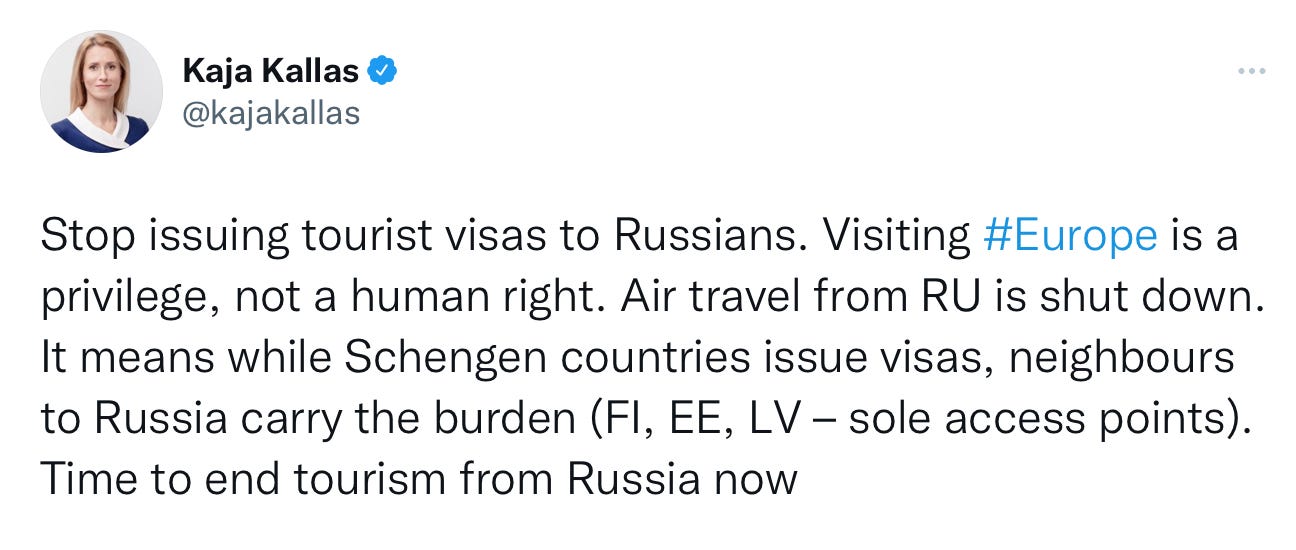The Evening Report - Aug 9
The energy crisis tightens its grip on Europe. Denmark shifts monkeypox vaccination strategy.
⚡️Energy Crisis⚡️
🇪🇺
As Europe faces the daunting task of severing all energy ties with Russia and replacing Russian gas with renewable energy, it has asked that all member nations reduce power consumption by 15%. Europe relies on natural gas for roughly a third of its total energy consumption. Of that, Russian gas accounts for around 40% of what Europe consumes. This already challenging situation is being made even more complicated by climate change as hot temperatures and a lack of rain result in plunging river levels. This is kneecapping hydroelectric production and has other impacts as well. All this as Russia weaponizes its energy exports to try and blackmail Europe into submission.
-
EU countries have approved the trading bloc’s emergency energy plan to curb gas use. However, support was not unanimous as both Poland and Hungary opposed the legislation. Hungary continues to be a thorn in the EU’s side as it questioned the legality of rules that have an impact on a country’s energy security and supply.
-
To add bad to worse, Northwest Europe is flirting with perilously low supplies of diesel fuel, heating oil, and other related fuels. Stockpiles of diesel fuels are projected to shrink to historically low amounts. This means much less of a supply cushion for the winter ahead, potentially exacerbating an already ugly energy crisis.
🇳🇴
After a meeting of the heads of the parliamentary parties on Monday, Norway’s Energy Minister released a statement on the country’s energy crisis. Rivers in the country are extremely low due to drought conditions. This is having a massive impact on hydroelectric production in Norway. The crisis is being exacerbated by what the energy minister called the “dramatic situation” in Europe due to Russia’s invasion of Ukraine and its “use of gas deliveries as an economic weapon against European countries.”
Energy Minister Terje Aasland says Norway’s electricity crisis is “serious.”
“We are in a demanding situation with very high electricity prices. In addition, we experience uncertainty about how the power situation will develop in the future. The government has therefore already taken several measures to reduce household electricity costs and secure the power supply through the winter and now see that these are working. But we also see the need for further measures.”
He says Norway must ensure security of supply for its own power needs while also abiding by power export agreements with other countries.
“We depend on our connections to Sweden, Denmark, Germany, the UK, Finland, and the Netherlands working well. It would be short-term and unwise to end this energy cooperation, even if the situation is now demanding. As EU countries, Sweden, Denmark, and Finland are covered by the same energy regulations as Germany and the Netherlands, with which we also have international connections. A breach of the cooperation under this framework will also be a breach of the Nordic energy cooperation. The European countries go to great lengths to stand together against Russia's economic warfare in the energy sector.”
Last week, Norway saw the lowest level of hydroelectric production so far this year. Hydroelectric production so far this year is 11.6 TWh, about 18% less than at the same point last year. All of this is resulting not just in less available power but also record high electricity prices.
“We cannot completely rule out a period of electricity rationing in the spring. But our professional authorities emphasize that the probability of this is low.”
Aasland says people shouldn’t worry and there will be electricity to power their homes through the coming winter. He adds that people need to remember Norway’s power production is weather dependent and with climate change there are major variations in weather conditions. While the energy crisis is being exacerbated by Russia, Norwegians need to prepare for unpredictable weather in the years to come and the associated energy impacts.
Norwegian authorities have asked that the Norwegian Water Resources and Energy Directorate provide detailed reporting including on reservoir levels, and an almost daily assessment of the power situation.
The government has also extended rebates and subsidies to businesses and individuals to try and alleviate rising energy costs. These schemes will continue and will likely even increase further. Aasland says a new “mechanism” is also in the works where critically low water reservoir levels will trigger “control mechanisms that limit the possibility of [electricity] export.”
🇫🇮
A Finnish energy expert is warning that the energy crisis may result in rotating blackouts in Finland.
Päivi Suur-Uski is an energy efficiency expert with Motiva. He spoke to Yle:
“Electricity availability depends largely on weather conditions and power generation. It can be hard to predict in the long run. For instance, we don't know if it will be a cold or mild winter.”
Suur-Uski says if it comes to power rationing, blackouts would be targeted at different areas and last anywhere between 30 minutes to two hours.
“In Finland, regions vary greatly in terms of population and electricity consumption. Power cuts are likely to have a bigger impact in densely populated areas.”
Even if it is unlikely, he advises, people stock up on essentials like water, food, candles, or a flashlight, should there be blackouts.
🇫🇷
France is experiencing its worst drought since records began to be kept in 1958, according to the French weather agency Meteo France. And with the weather heating up again, things are going to get worse. France saw less than a centimeter of rain in July. Water restrictions have been introduced and river and reservoir levels are in such crisis, that cities in more rural areas no longer have clean drinking water and are having to truck it in. The resulting impacts are multiplying with farmers warning of a winter milk shortage. Summer harvests are taking hit and will be about 20z less than usual. It will also continue to kneecap energy production as France relies on river waters to cool nuclear power plants.
🇩🇪
In Germany, river levels on the Rhine are so low you can walk across the river in some places, and commercial barges are now only loading to 30% capacity in order to function on the river. With no relief in sight, it’s all but guaranteed that German authorities will have to close the Rhine to commercial activity, perhaps was early as the next day or two. This is also sideswiping hydroelectric production and coal shipments that are barged into to coal-fired power plants,
🇬🇧
The energy crisis is tightening its grip on the UK. Electricity and gas prices are soaring . Bloomberg reports that the latest calculations for the retail price cap on electricity and gas have gone through the roof. The cap, which is currently £1,971 per year has been pegged to jump to £4,266 per year, as of January.
The British government is preparing an emergency energy plan as it braces for some variation of a worst case scenario, that could see peak demand outstrip supply. Among the measures on the table will be rolling blackouts for both businesses and households.
🦠Pandemic🦠
🇩🇰
For a 2nd week in a row Denmark’s COVID contact number, reinfection rate or R0, is 0.8 according to the Danish Health Ministry.
However, the ministry also notes that COVID wastewater surveillance shows what it calls “minor increases” of coronavirus activity across all five Danish regions.
-
Denmark added 5,444 COVID infections and 57 more coronavirus deaths since Friday. The number of pandemic deaths in recent weeks continues to be very high.
-
Yesterday, there were 8,271 PCR tests taken equaling a positivity percentage of 23.77%. The seven day positivity percentage is 24.98%.
-
COVID hospitalizations (427) are down day over day (-8) while the number of severe infection in an ICU (14) crept upward (+1) and of those the number on a ventilator (6) is unchanged. Infection admissions to a psychiatric facility (77) have edged up (+5).
🇸🇪
The Swedish Public Health Agency only updates its COVID numbers once a week on Thursdays.
-
COVID hospitalizations are climbing again in Sweden’s capital region. In its latest update, Region Stockholm says there were 286 infected people hospitalized; that is nine more than the week before. There are six severe infection cases in an ICU.
The region says over the last week hospitals have been seeing an average of 58 coronavirus-related patients per day. There is about a 50/50 split between people being admitted because of an infection and those needing other medical care who are also infected.
Chief Physician Johan Bratt:
“We know that this is an unpredictable disease. The infection spread should decrease during the summer when it is warm and more people are outside, but, unlike the last two years, we are seeing a summer infection wave. I have some concerns that the infection spread may pick up speed again when more people return to work and schools. Therefore, it is now especially important to stay at home and stay away from other people if you are feeling sick or have symptoms that could be COVID.”
Bratt says about 20% of the population in the capital region is not vaccinated. He says they are at much higher risk for severe infections resulting in hospitalization and death. He is urging everyone to get vaccinated as soon as possible.
In the last seven days, the region has recorded 1,178 coronavirus infections, with 126 of those being among seniors in care. This number is wildly underreported as Sweden restricts PCR testing to seniors in care and people being admitted to hospital.
In Region Stockholm there have been 17 more pandemic deaths in the last week. It continues to report that Sweden is still struggling with a backlog in reporting COVID deaths as it has been for many months now.
-
While concerns are rising about people suffering from long-COVID posing a longer term threat to the country’s healthcare systems, it appears Sweden is dismantling its infrastructure to deal with it. Sweden’s Radio Ekot is reporting that several Swedish regions have been dismantling special clinics designed to provide care and treatment to those suffering from long-COVID.
Swedish COVID Association President Tove Lundberg spoke to the media outlet:
“I think it is completely the wrong way to go. And I find it difficult to see that a primary care can stay so up to date on the research front, which is currently moving very quickly.”
Before they began to be dismantled, 12 of Sweden’s 21 regions had special long-COVID clinics set up.
Twelve of the country's 21 regions state to Ekot that they have special receptions for post-covid patients. But now many of these receptions are beginning to be discontinued.
Sahlgrenska University Hospital Board Chair Gustaf Josefson says in Gothenburg they have decided to stop accepting long-COVID referrals and close their clinic.
“Signals we get are that you are more than competent to be able to assess this at the primary care level and decide to which specialist to send these cases on to.”
🇩🇪
Germany recorded 78,698 infections on Tuesday while suffering another 179 coronavirus deaths.
It has added another 1,717 COVID hospitalizations and ICU numbers (1,330) have increased (+44). As a percentage of all intensive care beds in the country, coronavirus patients are using 6.3%.
To date, 77.9% of the total population has one vaccine dose, 76.2% have two, and 61.9% have had a booster dose.
-
German Health Minister Karl Lauterbach has tested positive for COVID. He took to Twitter to say that despite initial symptoms being mild, being double-boosted, and taking Paxlovid, his symptoms have become a little worse. He adds that he is hoping he will be fully recovered soon.
🇪🇺💉
The European Union has reached an amended agreement with Moderna to swap out all remaining COVID vaccine doses within existing contracts for the updated bivalent mRNA vaccine. The bivalent vaccine is a new formula designed to target the parent coronavirus strain and an Omicron variant. Once the new formula has been approved for use within the EU, then the new bivalent doses can begin to be shipped.
Along with exchanging existing contractually obligated doses, Moderna says the EU has also agreed to buy another 15 million doses of the updated vaccine.
Moderna CEO Stéphane Bancel:
“The European Commission and Moderna have been steadfast partners in the fight against the COVID pandemic. This agreement highlights the European Commission’s trust in our mRNA platform and next-generation bivalent COVID vaccines. Participating member states will now have access to Omicron-containing vaccine booster candidates, and protection against COVID, heading into the winter season."
Moderna has two bivalent vaccine candidate formulas one targeting BA.1, the parent Omicron variant, and the other is formulated to deal with BA.4 and BA.5, the sub-variants currently dominating Europe.
EU Health Commissioner Stella Kyriakides says the updated vaccine doses should begin arriving in September and through the fall. That is when European countries will begin another booster dose effort.
“Increasing COVID vaccination and booster rates will be crucial as we plan ahead for the autumn and winter months. To best ensure our common preparedness, Member States must have the necessary tools. This includes vaccines adapted to variants, as and when they are authorised by the European Medicines Agency. This agreement will ensure that Member States will have access to the vaccine doses they need at the right time to protect our citizens.”
🦠Monkeypox🦠
🇩🇰
The Statens Serum Institute says there are now 126 confirmed monkeypox infection in Denmark of which, 45 are travel related infections.
-
The Danish National Health Board has issued new monkeypox vaccination guidelines to include gay men who are at risk or have high-risk lifestyles. Previously, monkeypox vaccinations had only been offered to close contacts of an infected person as a preventative measure. Now, with the number of cases in Denmark growing, the inoculation effort has shifted from a defensive to a more offensive footing.
Deputy Director Helene Probst:
“Unfortunately, we have an increasing number of people infected with monkeypox in Denmark. We would very much like to bring the number of infection cases down and protect those who are most at risk. In addition to our strong focus on prevention, isolation, and easier access to testing, we are therefore also changing our vaccine strategy. We want to better protect those who are most at risk.”
The monkeypox vaccine, Imvanex, is taken in two doses 28 days apart.
“The full effect of the vaccine is only achieved after the second dose. But, we expect that the vaccine will have an effect about a week after the first dose, and you will therefore have a milder course of the disease if you become infected"
In Denmark, and across Europe, the majority of monkeypox infections are among gay or bisexual men. The health authority advises people, whether they are vaccinated or not, to follow some simple rules.
"It is still important that you are aware of monkeypox symptoms. It can present with flu-like symptoms, or a single blister in the mouth, or in the crotch; then you must avoid close contact, and sex, and contact the doctor by telephone. It is also important that you get tested.”
-
Danish Health Minister Magnus Heunicke says the new monkeypox vaccination guidelines will include 3,000-5,000 people at high risk due to things like HIV treatment.
“Denmark is the first country in the Nordics to have such an offer.”
He says the first vaccinations will begin this week.
As the vaccination effort shifts gears and expands eligibility, Heunicke says it will now be necessary to buy more vaccine doses. Pending parliamentary support, 10,000 doses of Imvanex will be purchased from Bavarian Nordic.
He is also emphasizing that the Statens Serum Institute still assesses that the chances of the monkeypox outbreak spreading to the general population “remain very low.”
🇬🇱
The monkeypox outbreak has arrived in Greenland. Two employees at Thule Air Base have been confirmed to be infected with the virus. The first two monkeypox infections were confirmed in Greenland. Both have been put into quarantine at the base where they will remain until declared healthy.
🇺🇦/ 🇷🇺 War
🇩🇰 🇸🇪 🇳🇴
Sweden, Denmark, and Norway are going to broaden military cooperation with a focus on flexing their combined military muscle in the Baltic Sea. The defense ministers from the three countries met in Malmö, Sweden, this week and announced the cooperation pact there.
The three Nordic nations control the passage in and out of the Baltic Sea.
Swedish Defence Minister Peter Hultqvist:
“The Sund Strait (Øresund in Danish) region, which is the entrance to the Baltic Sea, is strategically important for Sweden, Denmark, and Norway in case of a crisis or a war. A strengthened cooperation between the countries will allow for a better coordination of military operations. [Which]will enable the joint use of airspace and military infrastructure”.
Hultqvist added that the reason for the three countries increasing military cooperation is due to “irresponsible behaviour by Russia”.
“Fundamentally, we are dealing with an increased presence of Russia in the Baltic. Several times we have been witnesses to unprofessional and irresponsible behaviour on the part of Russia.”
Denmark and Norway are members of NATO. While Sweden is currently in the process of joining the alliance, along with neighbouring Finland.
🇪🇪/ 🇷🇺
The Prime Minister of Estonia is again urging a total ban on issuing tourist visas to Russian citizens.
🇫🇮/ 🇷🇺
Finnish Prime Minister Sanna Marin says “it’s not right” that Russian citizens are getting tourist visas and using Finland as a spring board to enjoy European summer vacations.
She spoke to Yle this week:
“It’s not right that at the same time as Russia is waging an aggressive, brutal war of aggression in Europe, Russians can live a normal life, travel in Europe, be tourists. It's not right.”
Marin says ideally a solution will be found at the European level covering all European Union and Schengen zone countries. But, she conceded her government may need to act.
"I believe that in future European Council meetings, this issue will come up even more strongly. My personal position is that tourism should be restricted.”
Finnish Foreign Minister Pekka Haavisto is suggesting that in the interim Finland could simply prioritize family, study, or visas ahead of tourist visas as one way to temporarily put a cork in the situation.
Since both countries removed COVID restrictions, the number of Russians getting tourist visas while crossing into Finland and Norway to do an end run around sanctions has surged.
-
Finland has joined Sweden, Canada, the Netherlands, and the United Kingdom in a major effort to train Ukrainian soldiers. The military training is taking place in the UK. The Finnish Ministry of Defense announced this week it will throw its support behind the training program. It will send about 20 members of its Armed Forces to the UK to help train thousands of Ukrainians.
-
The Finnish Parliament’s website crashed today after a denial of service cyberattack. Yle is reporting that a Russian hacker group has claimed to be behind the attack. The cyberattack was launched around 2:30 this afternoon.
-
A controversial World Peace statue in Helsinki has been removed and mothballed in another sign of increasingly frosty relations between Finland and Russia. The statue was a gift from Moscow to Helsinki in 1989. The statue is owned by the Helsinki Art Museum. It has been taken to a museum warehouse where its final fate will be decided at some point down the road. Since Russia”s invasion of Ukraine, debate has heated up in Helsinki about the statue.
🇸🇪 🇩🇰
NATO member countries continue to near-constant exercises with Swedish and Finnish Armed Forces as the two countries go through the process of joining the alliance. This week it was Denmark’s turn as its fighter jets joined their Swedish counterparts this week over the skies of both countries.
🇪🇺🇺🇦/ 🇷🇺 ☢️
EU Energy Commissioner Kadri Simson is demanding that Russian forces withdraw immediately from the Zaporizhzhia Nuclear Power Plant. Simson says Russia is violating all internationally agreed safety, security, and safeguards provisions by occupying Europe’s largest nuclear plant and deploying weapons and soldiers in and around it. She says she strongly condemns the latest shelling by the military causing significant damage to the plant’s infrastructure “including near the dry storage of spent nuclear fuel within the nuclear power plant perimeter.”
“This reckless behaviour by Russian military forces poses a great danger to the plant's safe operation, increasing significantly the risk of a nuclear accident and must not happen again. While information obtained from the EU's radioactivity monitoring systems as well as international sources does not indicate any increase in radioactivity in Ukraine or the EU nor any immediate radiation threat, military activities around nuclear power plants are unacceptably dangerous. The EU calls on Russia to ensure that repair works can be rapidly implemented and that the safety of the workers involved in them and in the operation of the Zaporizhzhia Nuclear Power Plant is guaranteed.”
Simson says the EU remains in close contact with the International Atomic Energy Agency and Ukrainian authorities on the situation at the power plant.
The IAEA has been lobbying, so far, to no avail, to lead a team to the power plant to secure it and offer any and all assistance for its safe operation. It says it needs cooperation from both Russia and Ukraine to make this happen, as well as backing by UN forces.




